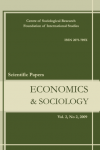WOMEN’S TENDENCY IN WORK
INVOLVEMENT: A STUDY OF
FEMALE LABOUR FORCE IN
INDONESIA
WOMEN’S TENDENCY IN WORK
INVOLVEMENT: A STUDY OF
FEMALE LABOUR FORCE IN
INDONESIA
Author(s): ... Susilo, Erlyn Yuniashri, Radityo Putro HandritoSubject(s): Gender Studies, Human Resources in Economy, Socio-Economic Research
Published by: Fundacja Centrum Badań Socjologicznych
Keywords: female labour; labour force; Indonesian women labour participation;
Summary/Abstract: Culture is perceived as the most prominent factor which causes inequality in work involvement, especially in the context of gender. In many cultures,“glass ceiling” of gender bias often makes women lessproductive than their male counterparts because of theirdomestic duties. As a matter of fact, Indonesian womenhave proven their potentials and abilities in boosting thenational economy. This study focuses on the effect ofdomestic duties, wages, and education on women’sparticipation in the workforce. Using logistic regressionand SUSENAS 2018 dataset, this research finds thatwomen with higher education and greater number ofchildren do not get involved in the workforce. Thissituation is inextricably associated with the predominantpatriarchal culture in their domestic lives, in which thehusbands assume absolute control, and women’s roles areusually limited to domestic sphere. As is the case of theother workers, women are more engaged in their workwhen they get higher wages. Women who live in urbanareas tend to have opportunities to be economicallyproductive.
Journal: Economics and Sociology
- Issue Year: 17/2024
- Issue No: 1
- Page Range: 151-165
- Page Count: 15
- Language: English

